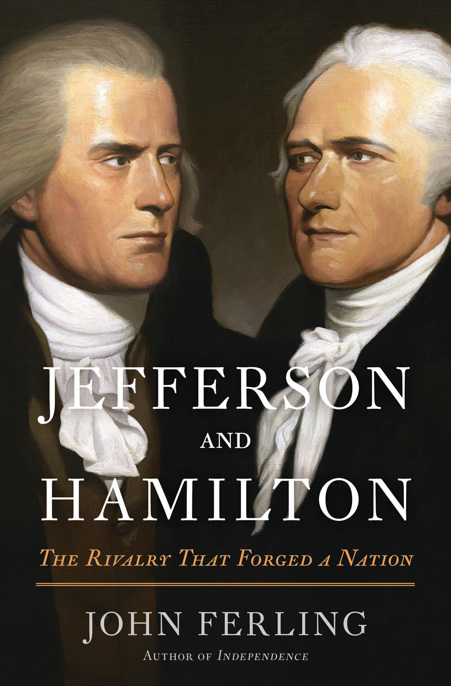
Jefferson and Hamilton
The Rivalry That Forged a Nation
کتاب های مرتبط
- اطلاعات
- نقد و بررسی
- دیدگاه کاربران
نقد و بررسی

August 5, 2013
Ferling’s latest venture into America’s origins opens up a new side of our country’s beginnings and the revolution never seemed so catty. With moments of exciting clarity, Ferling’s account of two of the most famous American revolutionaries offers gossip, intrigue, and a window into their heated and turbulent relationship. His detailed sketches of the childhoods of Jefferson and Hamilton, respectively, point to the similarity of their personalities and show how their ambitions as young men were shaped. As war breaks out between America and England, Ferling (Almost a Miracle) follows the competing yet parallel lives of these two men as their strong opinions about the future of America lead them to opposing sides in debates over federalism, republicanism, agrarianism, and banking. Though at points Ferling’s account gets weighed down by the “he said, she said” gossip found in the preserved letters of the Founding Fathers, his astute research congeals to bring the lives of Jefferson and Hamilton, Washington and Burr, and their contemporaries into our modern world. As personalities clash and egos are wounded, Ferling gives readers a chance to rediscover the birth of the United States through the characters who helped craft its most vital institutions.

May 15, 2013
Two antithetical but complementary Founding Fathers, duly and exhaustively compared and contrasted. Despite the enormous research already done in fleshing out the lives of the multitalented, ambitious Jefferson and Hamilton, Ferling (History, Emeritus/State Univ. of West Georgia; Independence: The Struggle to Set America Free, 2011, etc.) leaves no stone unturned in sifting through the biographies, walking readers through their respective childhoods, and flushing out influences that shaped their livelihoods and helped form their fundamental ideologies regarding the new nation. Though he came from the Southern aristocracy, Jefferson grasped early on the need for land reform as the only way to render the new country into a classical Enlightenment model of "republicanism." This radical ideology included emancipation of slaves, rejection of primogeniture, offering wider educational opportunities and granting freedom of religion. Hamilton, on the other hand, the survivor of a dysfunctional West Indies family, made good in life through his own industry, intelligence and connections. He was schooled in business and determined to distinguish himself in Washington's Continental Army even as a college student; yet even there, he gleaned the need for a centralized levying of taxes and imposts, the creation of a national bank and, presciently, the use of black soldiers. Jefferson's time as a diplomat in Paris underscored his views about alleviating the inequity of wealth, while Hamilton's work as a tax collector and lawyer convinced him of the need for "bracing the federal system" against "unrestrained popular passion." As Ferling scrupulously writes, the two founders had essentially different views of human nature: Hamilton believed in a natural elite, while Jefferson denounced the oppression of the many by the tyranny of the few. The author's comparative study is bold, brisk and lucid. From hammering out constitutional liberties and building the nation's banking system to jockeying in early elections, Ferling draws crisp, sharp delineations between his two subjects.
COPYRIGHT(2013) Kirkus Reviews, ALL RIGHTS RESERVED.

November 15, 2013
The Federalist era, with its strong personalities, crucial decisions, and turmoil of conflicting values, has long intrigued. Most books on the era have been biographies of an individual or else on the dynamics of a larger group. Ferling (history, emeritus, Univ. of West Georgia) focuses on Thomas Jefferson and Alexander Hamilton, locating the origins of their rivalry in their divergent upbringings, which led to their widely conflicting political viewpoints. Jefferson's ideas were shaped in plantation Virginia while Hamilton's emerged from his early ties to the cosmopolitan commercial world of New York. Jefferson was in France during much of the American republic's formative period, where he saw the downfall of centralized rule of the sort he detested. Hamilton, by contrast, stayed home working to secure a solid national economy as the U.S. Constitution was implemented. When the two, who met in the 1780s, became bitter rivals in the 1790s, their opposing positions came to define what would become the country's first political party system. Ferling ends his study with Hamilton's death in 1804. VERDICT With his descriptions of the intense ideological and political climate of the nation's early years, Ferling provides valuable perspective not only on the Founding Fathers and their accomplishments but, overtly, on today, when fierce differences divide people who say they are seeking to preserve their nation and its values. Highly recommended.--Charles K. Piehl, Minnesota State Univ., Mankato
Copyright 2013 Library Journal, LLC Used with permission.

























دیدگاه کاربران